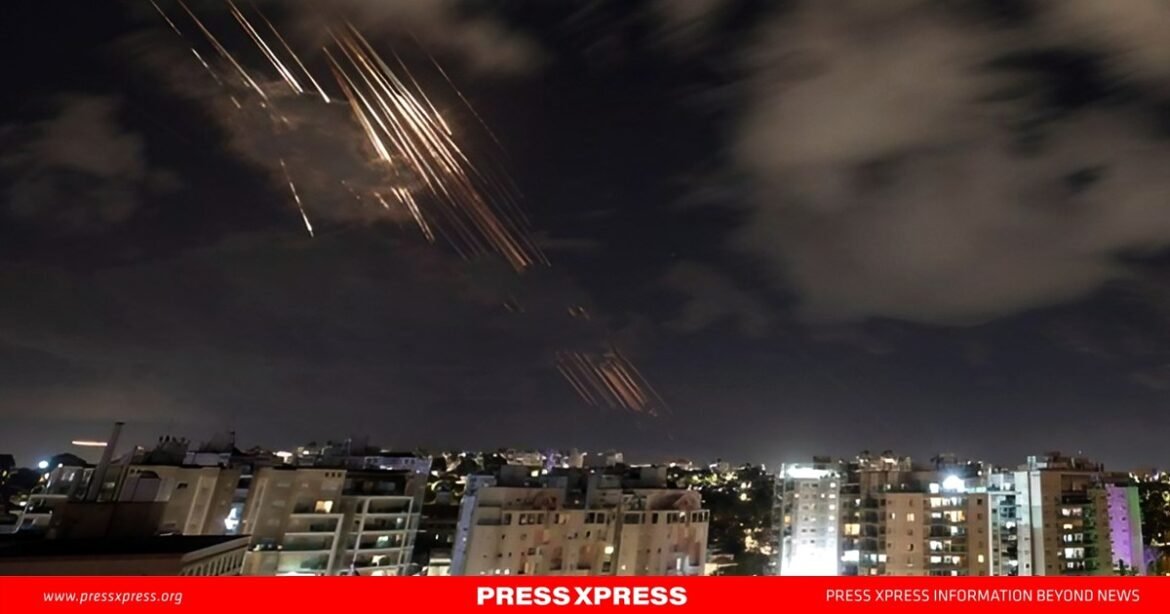Iran’s Islamic Revolutionary Guard Corps (IRGC) fired a series of missiles at Israel late Tuesday, in retaliation for the deaths of civilians in Gaza and the killings of Hamas and Hezbollah leaders. The IRGC warned of further “crushing” attacks should Israel retaliate.
Sirens echoed across Israel as the missiles rained down, with explosions heard in several cities. According to Israeli rescue services, two individuals in Tel Aviv suffered minor injuries from the missile strikes, and others were hurt while seeking shelter.
Earlier in the day, a shooting occurred in Tel Aviv’s Jaffa district, followed by the missile barrage. As air raid sirens blared, Israeli police confirmed at least four deaths, while local media put the figure at eight. The police also reported that two attackers had been neutralized.
A U.S. defense official confirmed that the U.S. was intercepting some of the missiles to assist in Israel’s defense. Following the attack, the White House announced that President Biden and Vice President Harris were closely monitoring the situation from the Situation Room. The U.S. played a critical role in defending Israel against a similar Iranian missile strike in April.
In a statement, the Israeli Defense Forces (IDF) emphasized its commitment to protecting civilians and urged Israelis to remain in sheltered areas. Israeli military spokesperson Daniel Hagari stated that the IDF is prepared to respond to the Iranian attack at an appropriate time.
“At this point, we still do not detect an aerial threat launched from Iran towards Israel,” Hagari said, adding: “We have dealt with this threat in the past and we will deal with it now as well.”
Moreover, Israeli military says residents can leave shelters about an hour after Israeli residents in certain areas were told to seek safety.
Iran’s Fars news agency reported that the missile attack was in retaliation for the deaths of Hezbollah leader Hassan Nasrallah and Hamas leader Ismail Haniyeh. The IRGC claimed responsibility for targeting Israeli territories in response to their deaths. Iran’s mission to the United Nations confirmed the attack in a statement, labeling it a legitimate response to what it described as the Zionist regime’s actions against Iranian nationals and interests. While the immediate missile barrage has ceased, the potential for further proxy attacks remains uncertain.
Hours before the attack, U.S. officials warned that Iran was preparing a missile strike, coinciding with Israel’s limited ground raids against Hezbollah in Lebanon. The U.S. government has reiterated its support for Israel’s defense, warning Iran of severe consequences for any direct assaults.
The U.S. Embassy in Israel issued a security alert, advising all U.S. government personnel and their families to shelter in place due to the ongoing conflict.
This latest missile attack follows a previous incident in April, where Iran launched more than 300 missiles at Israel, most of which were intercepted. U.S. officials have warned that this recent strike could be of equal or greater magnitude. As tensions continue to rise, the risk of a broader regional conflict remains high.”We are actively supporting defensive preparations to defend Israel against this attack,” the White House official said, adding that any direct “attack from Iran against Israel will carry severe consequences for Iran.”
Israel Defense Forces spokesman Rear Admiral Daniel Hagari said Tuesday that U.S. officials had informed the IDF that Iran could fire missiles “in the near future.”
“At this point, we still do not detect an aerial threat launched from Iran towards Israel,” Hagari said, adding: “We have dealt with this threat in the past and we will deal with it now as well.”
The U.S. Embassy in Israel issued a security alert Tuesday telling all U.S. government employees and their families to shelter in place “as a result of the current security situation.”
Iran last fired a salvo of ballistic missiles at Israel in April, in retaliation for an Israeli strike on the Iranian consulate in Syria’s capital, which killed a number of senior Iranian military commanders.
Iran launched more than 300 missiles and drones at Israel in that April attack, but Hagari said at the time that virtually all of the weapons were intercepted before entering Israeli territory, and he reported only minor damage to one military base from the few missiles that did land in the country. One 10-year-old girl was “severely injured by shrapnel” from an intercepted missile, but the IDF reported no additional casualties.
U.S. officials told media on Tuesday that a new attack from Iran could be as large or larger than the one in April. The officials said Iran has been ready to strike Israel again on short notice since early August, when Tehran threatened to retaliate for the assassination of Hamas leader Ismail Haniyeh in Tehran.
The IDF spokesman said Tuesday that Israeli Air Force planes were patrolling the skies “and our defense systems are at peak readiness.”
President Biden has called repeatedly for a cease-fire amid weeks of escalating fire between Israel and Hezbollah over the southern Lebanon border. U.S. officials at the White House, State Department and Pentagon have all made clear the risks of an all-out war between Israel and the well-armed Iranian proxy group in Lebanon, warning that it could spiral into a broad regional conflict.


